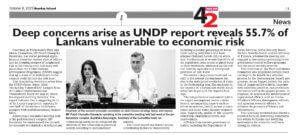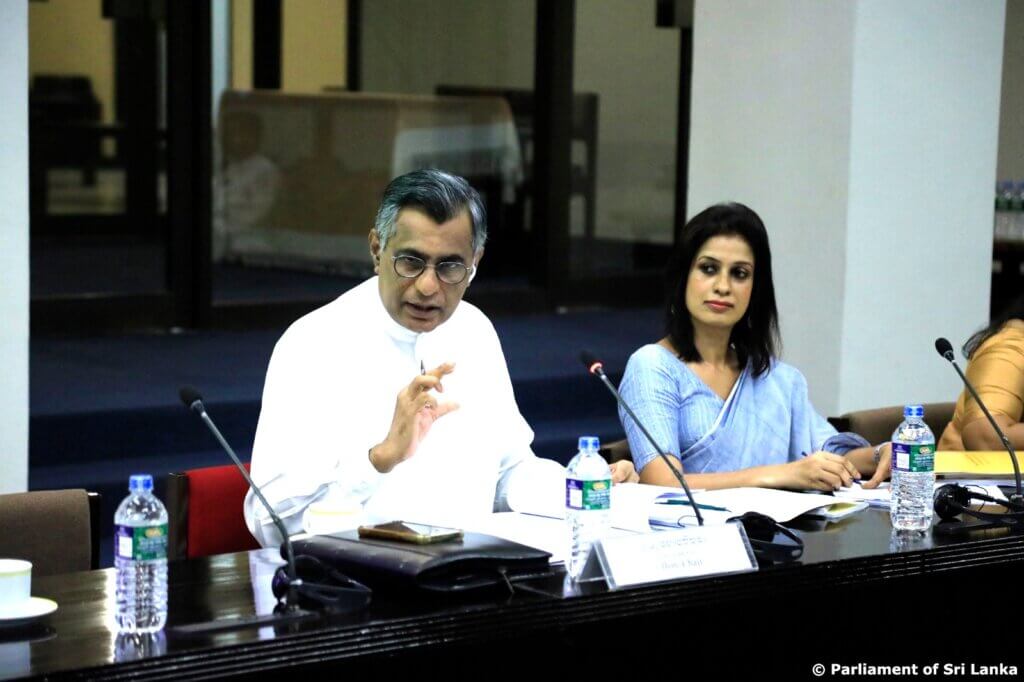Deep concerns arise as UNDP report reveals 55.7% of Lankans vulnerable to economic risk
The Island 08/10/2023 News Report
Chairman of the sectoral oversight committee on state finance strategy (ways and means) MP Patali Champika Ranawaka speaking at the committee meeting held last week at the parliamentary complex. Buddhika Abeysinghe, Secretary of the Committee looks on.
Chairman of Parliament’s Ways and Means Committee, MP Patali Champika Ranawaka, has voiced profound apprehension about the current state of affairs and the looming prospect of heightened risk in the coming year. Alarming estimates from the United Nations Development Programme (UNDP) suggest that up to 8 out of 10 individuals in the country could fall into the risk zone.
This disquieting revelation arises from the UNDP’s latest report titled ‘Navigating Vulnerability: Insights from Sri Lanka’s Multidimensional Vulnerability Index’ for 2022-23, which has exposed startling statistics. The report indicates that a staggering 55.7% of Sri Lanka’s population, equating to over half of the nation’s inhabitants, grapples with multidimensional vulnerability.
Addressing a committee meeting held at the parliamentary complex, MP Ranawaka has underscored the immediate necessity to establish a structured and robust social safety net to safeguard the interests of the vulnerable segments of society, according to parliamentary sources.
The UNDP report elucidates various contributing factors to vulnerability, including a notable percentage of households lacking individuals who have attained Ordinary Levels (OL) in education. Furthermore, it reveals that 35.6% of the population lacks access to piped water in their residences, underscoring the critical need for equitable and widespread provision of safe water.
Ranawaka’s deep concerns extend not only to the present circumstances but also to the anticipated escalation of risks in the forthcoming year. His emphasis on the urgency of a formal and sturdy social safety net aligns with the report’s findings.
The comprehensive assessment within the report encompasses twelve crucial factors, encompassing aspects such as school attendance, health, access to sustenance and clean water, disaster preparedness, adaptability, quality of life, property ownership, employment status, and indebtedness.
Officials from various governmental bodies, including the Department of Social Services, Social Security Board, Welfare Benefits Board, and the Ministry of Finance, attended the meeting and engaged in discussions pertaining to the government’s social welfare programs and the social security network.
The Chairman of the Ways and Means Committee also pinpointed certain shortcomings in the beneficiary selection process for the ‘Awaswasuma’ benefit programme. Issues flagged include the inclusion of inappropriate criteria, improper data collection practices, and procedural intricacies within the appeals process. In response, he proposed the involvement of experienced officers, such as Grama Niladhari Officers, development officers, and agrarian research officers, to enhance the process’s efficiency and effectiveness.
This alarming revelation has stirred a renewed focus on addressing vulnerabilities within Sri Lanka and fortifying mechanisms for economic resilience among its citizens.


